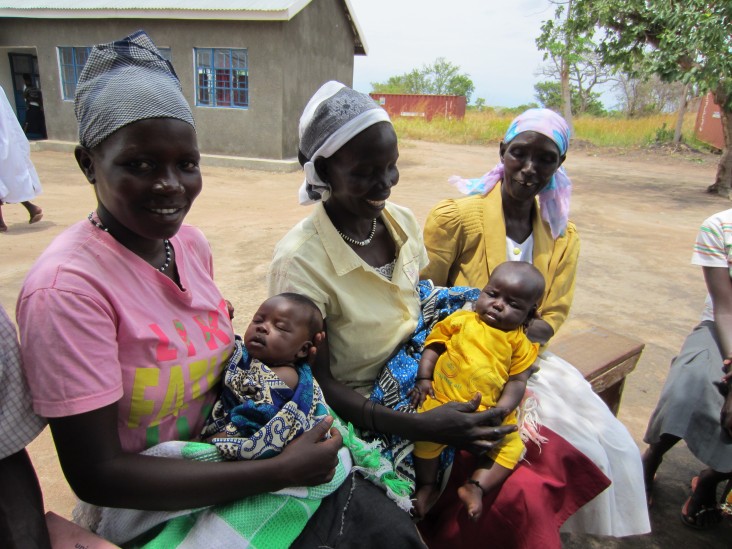
June 2014—When gunshots started in Lanyi town in December 2013, Wilma Avowa fled her home in this rural community five hours from South Sudan’s capital of Juba, fearing for her two pregnant neighbors, both of whom were due to deliver soon. The two women, Esther Maliga, 19, and Florence Lextion, 24, were at home resting.
Lextion’s husband was far away from the village tending to the family’s cattle. Her plan to give birth in the local health facility was quashed by the civil unrest embroiling her nascent country, which became independent less than three years before. She took the hands of her two children, 3 and 5 years old, and set off for the protection of the hillside about 2 kilometers away.
Most of their neighbors were gathered there, including Avowa and Maliga. The women crowded under a rock overhang, which hid them from sight. They stayed there through the night and most of the next day. Lextion and Maliga both went into labor that afternoon.
Luckily for both women, Avowa was prepared. A volunteer home health promoter for the past 18 months, Avowa, 58, had stored in her bag three doses of misoprostol—a drug that helps prevent postpartum hemorrhage—along with an educational flip chart and two “Mama Kits,” the basic essentials needed to assist in a birth, including a sterile blade, a small plastic sheet, soap, gloves and ligatures.
Avowa had been trained to use misoprostol as part of a lifesaving initiative supported by USAID. Postpartum hemorrhage is the leading cause of maternal deaths in most of the developing world. And South Sudan has the highest rate of maternal deaths in the world—2,054 per 100,000 live births, according to the U.N. Development Program.
“The good thing about miso, I could carry it with me when I ran,” says Avowa, using a common nickname for the drug. Unlike other drugs that cause the contraction of the uterus and control bleeding, misoprostol does not require refrigeration—making it ideal to prevent bleeding after birth in South Sudan, where the vast majority of the country’s 11 million people have no access to electricity.
Avowa is among the 260 home health promoters who have been trained through the Mundri Relief and Development Association with USAID support. USAID and its implementing partner Jhpiego aim to ensure that the populations of South Sudan’s Western and Central Equatoria States—approximately 2 million people—have access to an integrated package of primary health care services, including prenatal and safe birth assistance. Other donors are focusing similar efforts in South Sudan’s other eight states at the request of the Ministry of Health.
More than 1,000 South Sudanese women have benefited from this approach to saving lives since 2012, but no one could have imagined that this vital service would be provided in the bush.
“This program was started before the present crisis began, basically to meet the need of preventing postpartum hemorrhaging in a context where it is very difficult to reach health facilities, midwives are scarce and most women deliver at home,” said USAID Health Specialist Dr. Basilica Modi. “With the present crisis, the need for scaling up this particular intervention is even greater because, in the event that communities have to move, they normally move together with the health promoters who are part and parcel of their communities, so they will always be there with the pregnant women to provide them health education, counseling and misoprostol.”
When the time came to deliver, Avowa laid out a small bed sheet on the long grass and used the contents of the Mama Kit to assist Maliga in giving birth. After a baby girl was delivered, Avowa gave Maliga the misoprostol to prevent excessive bleeding. Three hours later, she did the same for Lextion, who also gave birth to a healthy baby girl. Avowa says she helped the women move back under the rock overhang with their babies soon after they delivered to keep them safe.
In spite of the conflict that erupted in South Sudan in December 2013, community midwives and volunteer home health promoters supported by USAID, including Avowa, have carried on their work—visiting pregnant women in their homes, helping them prepare a birth plan, and educating them on how to self-administer misoprostol. More than 100 pregnant women gave birth between December 2013 and January 2014 and survived, thanks to their efforts.
Links
Follow @USAIDSouthSudan, on Facebook, on Flickr







Comment
Make a general inquiry or suggest an improvement.